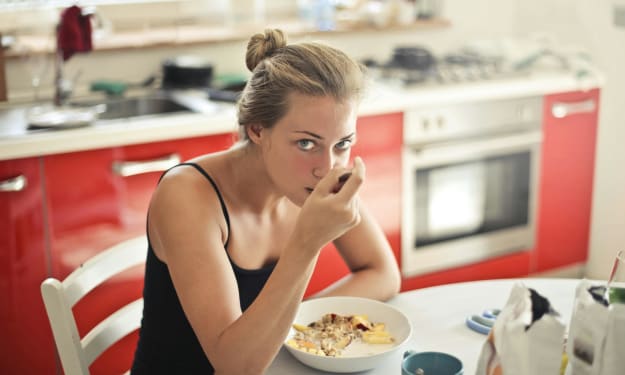What Vital Compound Do We Need To Build a Healthy Body?
Ask your mum if she knows

“Mum, do you know anything about proteins?"
“Is that the family who live at number forty-two?”
I'm trying to be more healthy
When you are healthy, you don't think about it. You can concentrate on your work and your hobbies. You can exercise, enjoy your food and feel good.
When you are unwell, that's all you can think about.
I want to understand my body better and what it needs to stay healthy. I heard proteins play a vital role in keeping us healthy. But I didn’t know what a protein is or what it does.
It was time to do some reading. How complicated can it be?
Proteins: Large biomolecules, or macromolecules, comprising one or more long chains of amino acid residues.
Well, that got complicated already. Before I find out about Proteins, I need to find out about amino acids.
Amino acids: Often referred to as the building blocks of proteins.
Any the wiser?
I asked an expert.
I learned we need amino acids to build proteins, manufacture hormones and neurotransmitters. So, amino acids are like bricks. When we piece bricks together we get a wall, and when we put the walls together we get the basics of a house. But not all the bricks are the same.
Just like letters in the alphabet, you can’t throw them together at random and expect to get a proper word. They have to be in the right sequence to be meaningful.
I needed to think about this in simpler terms.
Rather than bricks building a wall, I thought of amino acids as the ingredients of a recipe, let’s say for a chocolate brownie.
You need butter, sugar, vanilla extract, eggs, flour, cocoa powder, salt, and some chocolate chips. And just like a recipe, you need to combine these in a certain order:
- Place butter and chocolate chips in a heatproof bowl, microwave in 30-second bursts until melted. Stir until as smooth as Idris Elba's bottom.
- Add sugar and vanilla, mix, then add eggs and mix well until smooth and molten like Will Smith.
- Add flour, cocoa and salt and stir until smooth like Brad Pitt. Stir in chopped chocolate, pour into pan.
- Bake 24 minutes for a gooey centre like Keanu Reeves.
What you end up with is a nice dessert.
With different ingredients, you end up with a different result. One might be a soup, another might give you a hearty main course.
So, amino acids make up the proteins our bodies use to build tissue and muscle. Some proteins make hormones, the chemicals that help our body communicate what it needs to do to live. Other proteins form enzymes that play a role in making our muscles work, digest our food and release energy.
There are specialist proteins that form into antibodies to power our immune defence. They can break back down into amino acids during digestion, which gives us the energy we use to walk, jump, or skip down the road to the pub humming the latest Ed Sheeran hit.
Proteins are cool little compounds of amino acids. We can’t live without them. Our bodies can make some amino acids, but there are others we can’t make - these are the essential amino acids.
Essential Amino Acids
Our bodies need different amino acids to grow and function. All are important for good health. We classify nine amino acids as essential. Unlike nonessential amino acids, our body can’t produce essential amino acids, we have to get them through our diet.
A steak contains about 30g of protein per 100g. But we hear so many things about the detrimental effects of eating meat, where else can we get our essential amino acids?
An apple contains about 0.27 g of protein per 100g. Is it better to go with the steak?
An apple has one of the lowest ratios of protein in the plant family, but all plants contain some protein and there are several that might surprise you:
- Watercress contains about 2.3g of protein per 100g (gobsmacked).
- Beans, (kidney, soy, etc.) contain 6 - 8g of protein per 100g.
- Tofu or bean curd is a popular substitute for meat, typically the protein in Tofu varies from 3.5g to 15g per 100g.
- Chickpeas, lentils and peas contain about 9g of protein per 100g.
- Almonds and dry roasted peanuts contain 21g to 24g of protein per 100g
It looks like a nice nut roast will do the trick. And there are added benefits - frequent nut consumption protects against cardiovascular and cancer mortality. But the greatest eye-opener as a source of protein:
- Squash and pumpkin seeds contain about 30g of protein per 100g.
- Hemp seeds are No. 1, beating steak with 31.6g per 100g.
With a little thought, it is easy to get all your protein from a plant-based diet. And you get the additional benefits of all the extra vitamins, minerals, and fibre the plant contains.
"Does that explain it, Mum?"
"Why do you think I told you to eat up all your vegetables, son?"
About the Creator
Malky McEwan
Curious mind. Author of three funny memoirs. Top writer on Quora and Medium x 9. Writing to entertain, and inform. Goal: become the oldest person in the world (breaking my record every day).
Enjoyed the story? Support the Creator.
Subscribe for free to receive all their stories in your feed. You could also pledge your support or give them a one-off tip, letting them know you appreciate their work.






Comments
There are no comments for this story
Be the first to respond and start the conversation.